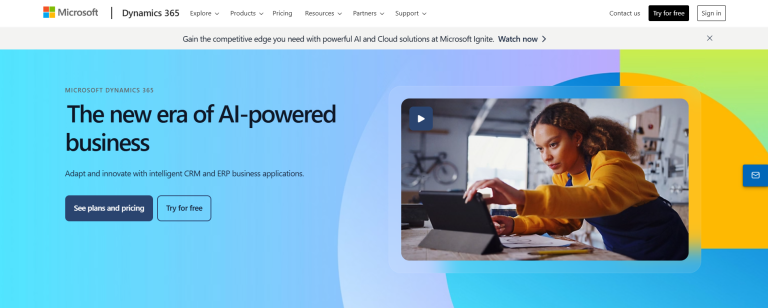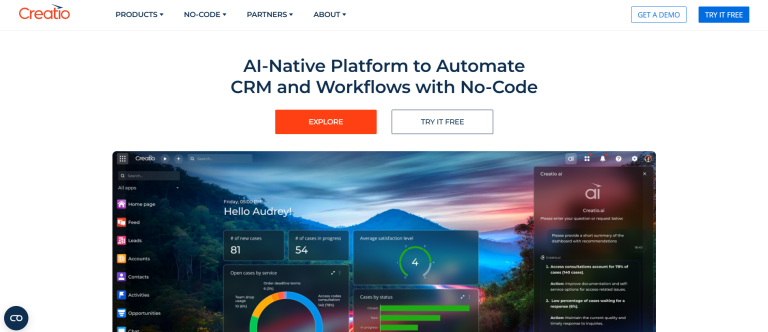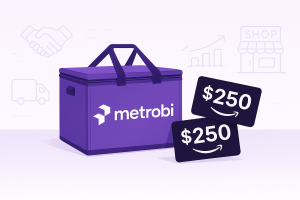In today’s fast-paced business world, building strong and profitable customer relationships is essential for growth and sustainability. A good CRM system can help businesses of all sizes streamline their processes, improve collaboration among customer service teams, and gain valuable insights into purchase history and contact details. Whether managing interactions with current customers or nurturing relationships with new customers, the best CRM software provides the tools necessary to support your entire team and ensure your business grows.
With cloud-based CRM software, you can access customer data from anywhere, eliminating manual data entry and enabling seamless communication. This article explores the top 10 CRM software that offer the perfect combination of features to maintain contact records, retain repeat customers, and optimize business performance.
Save 80% of delivery management time
We handle everything:
- Dedicated operations manager
- Real-time tracking dashboard
- Automated customer notifications
- Urgent issue resolution
Must-Have CRM Features for Managing Customer Data
Managing customer data effectively is at the heart of every successful customer relationship management software. A good CRM system ensures that all aspects of customer interactions, from their first touchpoint to their repeat purchases, are tracked and leveraged to enhance the customer journey. Below are the essential features that businesses should look for to make the most out of their CRM tools:
Centralized Customer Data Repository:
A reliable CRM system centralizes contact records, making it easier for teams to access detailed profiles of both current customers and new customers. With all customer information in one place, businesses can ensure every team member has up-to-date data on purchase history, preferences, and interactions, enabling a seamless customer experience.Advanced-Data Analytics and Reporting:
Analyzing customer activity and trends is key to identifying growth opportunities. The best CRM platforms offer advanced analytics that uncover patterns in purchase history and sales performance, helping businesses tailor their strategies. This feature also enables sales teams to gain insights into the effectiveness of their processes and make data-driven decisions to improve sales productivity.Automation for Repetitive Tasks:
Automation capabilities, such as automating data entry and follow-up emails, can significantly reduce manual workload. By automating these repetitive tasks, businesses can free up their teams to focus on more strategic activities, such as nurturing repeat customers and engaging potential customers.Real-Time Updates and Collaboration:
Keeping contact details and customer profiles up to date in real time is vital for effective team collaboration. A cloud-based CRM ensures that customer data is accessible to the entire team regardless of location, fostering better communication across sales and marketing teams as they work toward shared goals.Customization and Scalability:
As your business grows, your CRM system should evolve with it. Look for platforms that allow for customization, whether it’s adding new workflows, custom fields, or integrations with third-party tools, ensuring the CRM adapts to your specific business needs.
Top 10 Customer Relationship Management Software Comparison Table
Software | Use Case | Best For | Price |
|---|---|---|---|
Salesforce | Advanced CRM features for enterprise scalability | Large organizations needing customization | Starts at $25/user/month |
HubSpot CRM | All-in-one free CRM with marketing tools | Businesses looking for integrated marketing/sales | Free; Paid plans start at $50/user/month |
Zoho CRM | Affordable CRM with AI and custom dashboards | SMEs seeking affordability and functionality | Starts at $14/user/month |
Pipedrive | Sales pipeline management | Sales teams focused on pipeline optimization | Starts at $14/user/month |
Microsoft Dynamics 365 Sales | Advanced analytics and seamless integrations | Enterprises already using Microsoft products | Starts at $65/user/month |
BIGContacts | Simple CRM with email marketing and automation | Startups and small businesses | Free for up to 100 contacts; Paid plans start at $9.99/user/month |
Insightly CRM | CRM with easy data input and project management | Growth-stage businesses | Starts at $29/user/month |
Creatio CRM | Process-driven CRM with low-code capabilities | Larger sales organizations needing process management | Contact sales for pricing |
Monday.com CRM | Project management tool with CRM features | Teams looking for user-friendly collaboration tools | Starts at $12/user/month |
Folk | Simplified CRM for team collaboration | Small teams needing simplicity | Starts at $20/user/month after a free trial |
1. Salesforce
Best For Large organizations needing extensive customization and scalability

Pros | Cons |
|---|---|
✔️ Highly customizable, allowing businesses to tailor the system to their needs. | ❌ Expensive for smaller businesses or startups. |
✔️ Scalable and suitable for large teams managing complex processes. | ❌ Steep learning curve for new users. |
✔️ Extensive integration options with third-party tools and platforms. | ❌ Can be time-consuming to set up and optimize. |
Overview
Salesforce is one of the most recognized names in customer relationship management (CRM) software, offering unmatched scalability and customization options. Designed to support large organizations, Salesforce allows businesses to streamline sales and marketing efforts, track customer interactions, and improve customer relationships with its vast CRM tools.
The platform’s cloud CRM capabilities provide real-time access to customer data across sales and marketing teams, making it an invaluable tool for managing customer interactions and sales pipelines. With features like advanced analytics, marketing automation, and sales force automation, Salesforce empowers teams to identify trends, optimize business performance, and increase revenue. However, its extensive features may feel overwhelming for smaller teams or those new to CRM systems.
Salesforce integrates seamlessly with thousands of third-party apps, offering businesses the flexibility to adapt the system to their unique needs. While it excels in boosting productivity and enhancing customer relationships, the platform’s high cost and complexity may require significant investment in training and onboarding. In today’s competitive landscape, leveraging tools that offer insightful forecasting capabilities is essential for effective business decision-making. For deeper insights into trends and smarter choices, explore how you can enhance your strategy with predictive analytics.
Key Features
Advanced customization for workflows, dashboards, and reports.
Comprehensive sales force automation for managing sales leads and sales activities.
Cloud-based architecture to access customer information and sales data anywhere.
Integration capabilities with tools like Slack, Google Workspace, and Mailchimp.
Robust marketing automation tools for personalized email templates and campaigns.
AI-driven insights to identify trends and optimize sales forecasting.
Sales pipeline tracking to monitor and manage sales cycles.
Customer service tools to improve interactions and support teams.
Pricing Details
Salesforce pricing starts at $25/user/month for the Starter plan. Additional plans with more features are available at higher price points.

Salesforce Use Case & User Feedback
Salesforce is ideal for large businesses and enterprises that require a robust CRM platform to manage complex sales pipelines, enhance customer relationships, and boost sales productivity. It’s a top choice for industries like finance, healthcare, and technology, where accessing up-to-date customer data and automating repetitive tasks can significantly impact performance.
Users consistently praise Salesforce for its scalability and integration options, including phone systems, e-commerce platforms and many others. Highlighting its ability to provide personalized customer experiences and support sales and marketing teams effectively. However, some users note the platform’s high cost and the steep learning curve, particularly for small businesses or teams unfamiliar with CRM systems.
2. HubSpot CRM
Best For Businesses looking for an integrated marketing and sales solution

Pros | Cons |
|---|---|
✔️ Free tier with robust CRM features. | ❌ Limited scalability for large enterprises. |
✔️ User-friendly interface that requires minimal training. | ❌ Advanced features require higher-tier plans. |
✔️ Seamless integration with HubSpot’s marketing tools. | ❌ Limited offline capabilities. |
✔️ Comprehensive customer relationship management software for small and medium businesses. | ❌ Reporting capabilities can be basic in lower plans. |
Overview
HubSpot CRM is a versatile and intuitive customer relationship management software that offers a free plan loaded with valuable features for small and medium businesses. It helps manage customer relationships effectively, enabling businesses to track customer interactions, streamline sales processes, and optimize their marketing efforts. The platform’s emphasis on marketing automation and sales alignment makes it particularly useful for sales and marketing teams seeking to boost productivity and improve customer experiences.
What sets HubSpot CRM apart is its seamless integration with the broader HubSpot ecosystem, including tools for email marketing, lead generation, and sales pipeline management. Its user-friendly design ensures businesses can adopt the system with minimal effort, reducing the need for extensive training. However, while the free plan is a huge benefit for startups, advanced features like detailed analytics and reporting require upgrading to paid plans.
Key Features
Free CRM software tier with essential features like contact management and lead tracking.
Marketing automation tools for personalized email campaigns and follow-up messages.
Sales pipeline management for improved tracking and sales team productivity.
Integration with HubSpot’s ecosystem for enhanced marketing and sales capabilities.
Customizable dashboards to monitor the sales process and business performance.
Mobile app to access customer data and manage tasks on the go.
Email tracking and templates for more personalized customer experiences.
Pricing Details
HubSpot CRM offers a free version, with paid plans starting at $50/user/month for the Starter plan.

HubSpot CRM Use Case & User Feedback
HubSpot CRM is perfect for small businesses and startups that need a free yet feature-rich CRM solution to manage customer interactions and sales activities. It’s also highly beneficial for marketing teams focused on automating repetitive tasks and creating more personalized customer experiences.
Users praise HubSpot CRM for its ease of use and the breadth of features included in the free plan. Many small business owners highlight its ability to streamline the customer journey and boost lead generation. However, some feedback suggests that advanced tools like sales forecasting and detailed reporting could be more robust, especially for growing businesses.
3. Zoho CRM
Best For Small to medium-sized enterprises (SMEs) seeking affordability and functionality

Pros | Cons |
|---|---|
✔️ Affordable pricing for growing businesses. | ❌ Limited customization options compared to enterprise-level CRM tools. |
✔️ Integration with Zoho’s ecosystem of apps. | ❌ Mobile app performance can be inconsistent. |
✔️ AI capabilities for predictive sales insights. | ❌ The interface may feel outdated for some users. |
Overview
Zoho CRM is an affordable yet powerful customer relationship management CRM platform that caters to small and medium-sized businesses. Its rich feature set includes AI-driven analytics, customizable dashboards, and tools for managing customer relationships effectively. Zoho CRM is known for helping businesses gain insights into customer data, automate repetitive tasks, and improve sales productivity through its well-rounded CRM features.
This cloud CRM software integrates seamlessly with Zoho’s suite of tools, making it an excellent option for businesses already using Zoho apps. From sales forecasting to contact management, Zoho CRM provides businesses with the tools needed to optimize sales cycles and improve business performance. While its affordability makes it appealing to smaller teams, enterprise users may find its customization options somewhat limited compared to larger CRM systems.
Key Features
AI-powered sales assistant for predictive insights and sales lead tracking.
Customizable dashboards and reports to monitor the team’s performance.
Sales pipeline management tools for organizing sales activities and contacts.
Integration with Zoho apps like Zoho Desk, Zoho Books, and Zoho Campaigns.
Marketing automation capabilities to streamline campaigns.
Mobile CRM app for accessing up-to-date customer information on the go.
Pricing Details
Zoho CRM pricing ranges from $14/user/month to $52/user/month, making it one of the most affordable CRM tools on the market.

Zoho CRM Use Case & User Feedback
Zoho CRM is best suited for SMEs that need an affordable and functional solution to manage customer relationships and streamline their sales processes. It’s also ideal for businesses that rely heavily on Zoho’s ecosystem of tools for their operations.
Users commend Zoho CRM for its affordability and versatility, with many small business owners appreciating its seamless integration with other Zoho apps. However, feedback suggests the platform could improve its user interface and mobile app performance to offer a smoother experience for sales and marketing teams.
4. Pipedrive
Best For Sales teams focused on pipeline management

Pros | Cons |
|---|---|
✔️ Visual sales pipeline to easily manage sales activities. | ❌ Lacks advanced reporting and analytics in basic plans. |
✔️ Customizable pipeline stages and filters. | ❌ Limited customer service features compared to other CRMs. |
✔️ Activity-based selling to boost sales productivity. | ❌ No free plan available. |
✔️ Easy-to-use interface with minimal setup required. | ❌ Integration options are fewer compared to larger CRM platforms. |
Overview
Pipedrive is a CRM solution built specifically for sales teams, offering an intuitive visual sales pipeline that allows sales reps to manage and track their deals more efficiently. This CRM software simplifies the sales process by providing a customizable pipeline and helping teams stay on top of sales activities, follow-up messages, and important deadlines. Pipedrive excels in boosting sales productivity and helping teams focus on closing more deals through activity-based selling.
The platform’s easy-to-use interface and customizable reporting features make it a great tool for businesses looking to increase sales and streamline their sales cycle. However, while Pipedrive offers solid functionality for sales teams, it lacks certain advanced reporting and customer service capabilities that more comprehensive CRM systems provide.
Key Features
Visual sales pipeline with a drag-and-drop interface for pipeline management.
Customizable pipeline stages to fit your sales process.
Activity-based selling with task and deadline management.
Email integration for tracking communication with potential customers.
Sales forecasting tools to identify trends and predict sales performance.
Mobile app for on-the-go access to customer data and sales activities.
Pricing Details
Pipedrive starts at $14/user/month for the Essential plan.

Pipedrive Use Case & User Feedback
Pipedrive is ideal for sales teams looking to optimize their sales process and improve pipeline management. Its visual pipeline helps sales reps track and manage leads more efficiently, ensuring that they don’t miss crucial follow-ups and sales opportunities.
Users appreciate Pipedrive’s ease of use, and many sales teams find it to be a powerful tool for tracking deals and automating sales tasks. However, some users feel that Pipedrive could benefit from more in-depth reporting capabilities and better integration options for marketing automation.
5. Microsoft Dynamics 365 Sales
Best For Enterprises already using Microsoft products

Pros | Cons |
|---|---|
✔️ Seamless integration with Microsoft 365 suite. | ❌ High pricing can be a barrier for smaller businesses. |
✔️ Advanced analytics and AI capabilities for insights. | ❌ Steep learning curve for new users. |
✔️ Robust sales automation and sales forecasting tools. | ❌ Limited customization options without developer assistance. |
✔️ Strong security features for enterprise-level data management. | ❌ Performance can slow with large amounts of data. |
Overview
Microsoft Dynamics 365 Sales is an enterprise-level CRM solution designed for organizations that already use Microsoft products, providing seamless integration with the entire Microsoft 365 suite. This CRM platform offers advanced analytics, sales automation, and sales forecasting tools to help businesses drive better customer relationships and make more informed sales decisions.
Its AI-powered insights and reporting capabilities allow businesses to track customer interactions, identify trends, and predict sales performance with accuracy. However, the platform’s high cost and complexity make it more suited for large businesses that need robust CRM tools to handle complex sales cycles and manage large volumes of customer data.
Key Features
Seamless integration with Microsoft 365 apps, including Outlook, Teams, and SharePoint.
Advanced AI-powered insights for sales forecasting and lead scoring.
Sales automation tools to streamline repetitive tasks and improve sales productivity.
Customizable dashboards and reports to monitor sales activities and team performance.
Data security with enterprise-grade protection for customer information.
Mobile CRM app to access sales and customer data on the go.
Pricing Details
Pricing for Microsoft Dynamics 365 Sales starts at $65/user/month.

Microsoft Dynamics 365 Sales Use Case & User Feedback
Microsoft Dynamics 365 Sales is ideal for large enterprises or businesses already embedded within the Microsoft ecosystem. Its robust features help sales teams streamline their sales process and gain deep insights into customer data, boosting productivity and sales performance.
Users appreciate the platform’s integration with Microsoft products, but many mention that it can be overwhelming for those unfamiliar with Microsoft’s ecosystem. Additionally, the high cost and steep learning curve are common points of feedback, making it more suited for enterprises with dedicated IT support.
6. BIGContacts
Best For Startups and small businesses needing cost-effective solutions

Pros | Cons |
|---|---|
✔️ Free for up to 100 contacts. | ❌ Limited features in the free version. |
✔️ Affordable paid plans for growing businesses. | ❌ Basic reporting capabilities. |
✔️ Easy-to-use interface with minimal setup. | ❌ Lacks advanced automation features. |
✔️ Email marketing and task management capabilities. | ❌ Limited third-party integrations. |
Overview
BIGContacts is a simple, user-friendly CRM solution tailored for startups and small businesses. It offers a free plan for up to 100 contacts, making it an excellent option for new businesses looking to manage customer relationships without the upfront cost. BIGContacts includes essential features like contact management, email marketing, and task management, allowing small teams to organize their sales and customer activities effectively.
While the free plan is a major benefit, the platform’s limited functionality in comparison to larger CRM systems means businesses may need to upgrade to unlock more features as they scale. Despite this, its simplicity and affordability make it a solid choice for businesses just getting started with CRM tools.
Key Features
Free CRM plan for up to 100 contacts with essential CRM features.
Email marketing capabilities to manage campaigns and customer outreach.
Task and activity management for streamlined sales activities.
Customizable contact management with detailed customer information.
Mobile CRM app to manage customer interactions from anywhere.
Simple reporting to track team performance and sales progress.
Pricing Details
BIGContacts is free for up to 100 contacts, with paid plans starting at $9.99/user/month.

BIGContacts Use Case & User Feedback
BIGContacts is best suited for startups and small businesses looking for an easy-to-use CRM that doesn’t come with high costs. It’s ideal for teams that need basic CRM functionality and want to stay organized without breaking the bank.
Users appreciate the affordability of BIGContacts, particularly the free plan that allows small businesses to get started quickly. However, feedback suggests that businesses seeking advanced features may find it lacking, particularly when it comes to reporting and integrations with third-party tools.
7. Insightly CRM
Best For Growth-stage businesses looking for ease of use

Pros | Cons |
|---|---|
✔️ Easy-to-use interface that requires minimal training. | ❌ Limited customization options compared to other CRM systems. |
✔️ Powerful integration options with popular apps. | ❌ Lacks advanced reporting and analytics features. |
✔️ Flexible pricing plans for businesses of different sizes. | ❌ The mobile app can sometimes be slow and clunky. |
✔️ Strong task and project management tools. | ❌ No free plan available. |
Overview
Insightly CRM is designed to help growth-stage businesses manage customer relationships and sales activities with ease. It combines customer relationship management with task and project management tools, making it ideal for businesses that need to manage both customer interactions and projects simultaneously.
The platform’s user-friendly interface and strong integration capabilities make it easy for businesses to track sales leads, manage contacts, and collaborate with their teams. However, while Insightly offers many useful features, its reporting and analytics capabilities may not be as robust as some of its competitors, which could be a drawback for businesses with more complex needs.
Key Features
Task and project management tools for seamless team collaboration.
Customizable contact management for better tracking of customer interactions.
Integration with popular apps like Google Workspace, Office 365, and MailChimp.
Sales pipeline management for easy tracking of deals and leads.
Email marketing integration to reach out to potential customers.
Mobile app to access customer data and manage tasks from anywhere.
Pricing Details
Insightly CRM starts at $29/user/month.

Insightly CRM Use Case & User Feedback
Insightly is a great option for growth-stage businesses looking for a CRM that combines both customer relationship management and project management. It’s perfect for teams that need an all-in-one solution to handle sales leads, customer interactions, and project management.
Users appreciate the simplicity of Insightly’s interface and its strong integration options with third-party apps. However, some feedback indicates that the platform could benefit from more robust reporting tools and improved performance in its mobile app.
8. Creatio CRM
Best For Larger sales organizations needing comprehensive process management

Pros | Cons |
|---|---|
✔️ Low-code customization options to tailor workflows. | ❌ Complex interface for beginners. |
✔️ Robust business process management (BPM) capabilities. | ❌ High learning curve for new users. |
✔️ Advanced automation tools to improve efficiency. | ❌ Pricing can be expensive for smaller organizations. |
✔️ Flexible platform with seamless integrations. | ❌ Requires dedicated resources for full implementation. |
Overview
Creatio CRM is designed for larger sales teams or organizations that need a highly customizable, process-driven solution. With its low-code platform, businesses can build and tailor their workflows, making it an attractive option for companies with complex sales and marketing processes. Creatio also boasts strong business process management (BPM) capabilities, which help streamline workflows and reduce manual tasks. Its powerful automation tools and customization features ensure that businesses can adapt the CRM to their unique needs.
While Creatio CRM offers a lot of flexibility, its complexity can be overwhelming for beginners, especially those with no prior CRM experience. The pricing model may also be a challenge for smaller organizations, and the initial setup can require considerable time and resources to fully integrate and customize the platform.
Key Features
Low-code customization options to tailor workflows and processes.
Business Process Management (BPM) capabilities for enhanced workflow efficiency.
Advanced automation tools to automate repetitive tasks and improve productivity.
Flexible platform with integration capabilities for seamless data sharing.
Detailed reporting and analytics to track performance and improve decision-making.
Pricing Details
Pricing varies based on features and requirements; contact sales for details.
Creatio CRM Use Case & User Feedback
Creatio CRM is best suited for larger organizations or sales teams that require process management and detailed customization. It excels at automating complex workflows and managing multiple business processes in one platform.
Users appreciate its low-code capabilities and powerful BPM tools, but many report that the platform can be difficult to navigate for those unfamiliar with process management systems. Additionally, the pricing structure may make it less accessible for smaller businesses or startups.
9. Monday.com CRM
Best For Teams looking for a user-friendly project management tool with CRM capabilities

Pros | Cons |
|---|---|
✔️ Highly adaptable interface for diverse business needs. | ❌ Lacks some advanced CRM-specific features. |
✔️ Easy-to-use and intuitive setup process. | ❌ Some limitations in reporting and analytics. |
✔️ Seamless collaboration tools to enhance team communication. | ❌ Pricing can get expensive as teams scale up. |
✔️ Customizable workflows to fit different project needs. | ❌ Could benefit from more advanced automation capabilities. |
Overview
Monday.com CRM is built for teams that need a project management solution with CRM functionality. This platform combines the best features of project management and customer relationship management into a single, adaptable tool. It offers an intuitive, easy-to-use interface with a simple setup process, making it ideal for teams that need to get up and running quickly. Monday.com CRM excels at enhancing team collaboration through its built-in communication tools, which allow for seamless communication and task management across departments.
However, while Monday.com CRM is perfect for basic CRM needs, it lacks some advanced CRM-specific features like deep sales reporting and analytics. As businesses scale, pricing can also become a concern, especially for larger teams that require more advanced capabilities.
Key Features
Highly adaptable interface that can be tailored to a variety of project management and CRM needs.
Collaboration tools for efficient team communication and task management.
Customizable workflows for managing leads, sales processes, and projects.
Email integrations with Gmail and Outlook for managing communications in one place.
Project tracking features to monitor team progress and deadlines.
Pricing Details
Starts at $12/user/month.

Monday.com CRM Use Case & User Feedback
Monday.com CRM is perfect for teams that are looking for a simple and flexible solution that combines project management with CRM functionalities. It’s ideal for teams who need to keep all aspects of their operations in one place and foster better collaboration.
Users love the platform’s easy setup, adaptability, and robust communication tools. However, some feedback suggests that Monday.com CRM may not be powerful enough for businesses that require advanced CRM features, such as detailed sales forecasting or in-depth analytics. Additionally, as teams grow, the pricing can escalate quickly, which may be a consideration for scaling businesses.
10. Folk CRM
Best For Small teams wanting simplicity and collaboration features

Pros | Cons |
|---|---|
✔️ Direct integration with Gmail and Slack. | ❌ Lacks advanced sales automation features. |
✔️ Intuitive and user-friendly interface. | ❌ Limited customization options compared to larger CRMs. |
✔️ Focus on team collaboration and communication. | ❌ Doesn’t offer advanced reporting or analytics tools. |
✔️ Affordable pricing for small teams. | ❌ Some integrations may require additional configurations. |
Overview
Folk CRM is designed for small teams or startups that need a simple, user-friendly solution to manage customer relationships and improve team collaboration. With direct integrations with popular tools like Gmail and Slack, Folk CRM ensures that communication is seamless, and teams can manage their tasks and projects without switching between multiple apps. The platform’s interface is highly intuitive, allowing teams to quickly get started without the need for extensive training.
However, Folk CRM lacks some of the advanced features offered by larger, more established CRM platforms. It doesn’t include advanced sales automation or reporting capabilities, which may be limiting for businesses that require deeper insights into their sales performance. Despite these limitations, Folk remains an affordable option for small teams that prioritize ease of use and collaboration.
Key Features
Integration with Gmail and Slack for easy communication and task management.
Simple, intuitive interface designed for small teams with minimal CRM experience.
Collaboration tools to ensure better communication and team workflow.
Task management to track and manage customer interactions.
Customizable pipelines for organizing sales and customer relationships.
Pricing Details
Starts at $20/user/month after a free trial.

Folk CRM Use Case & User Feedback
Folk CRM is ideal for small teams or businesses that don’t require advanced CRM functionalities but want an easy-to-use tool to manage customer interactions. Its focus on simplicity and collaboration makes it perfect for teams who are looking to streamline their communication and task management.
Users appreciate Folk’s straightforward interface and integration with popular communication tools like Gmail and Slack. However, some users point out that it lacks advanced CRM features such as sales automation and reporting, which may hinder growth for businesses looking for more data-driven insights. Despite these shortcomings, Folk is a solid choice for teams looking for an affordable and simple solution.
Tips for Choosing and Implementing the Right CRM System
Selecting the right CRM is a pivotal decision that can shape your business’s ability to manage customer relationships effectively. Whether your goal is improving customer service teams’ workflows or organizing customer data, following a structured approach will ensure you choose a solution that aligns with your needs. Here’s a comprehensive guide:
Understand Your Business Needs:
The first step is to identify the pain points your business is currently facing. Are you looking to improve contact record management, streamline data entry, or enhance collaboration among your entire team? By defining your priorities, you’ll narrow your options to CRM systems that offer the features you need most.Evaluate CRM Usability:
A CRM platform should enhance productivity, not complicate processes. During free trials or demos, evaluate how intuitive the interface is and whether it simplifies managing customer information and tracking sales activities. A good CRM system will cater to both technical and non-technical team members with minimal learning curves.Focus on Integration Capabilities:
Your CRM should work seamlessly with tools you already use, such as email platforms, marketing automation software, and data analysis tools. For instance, if your team relies on third-party apps for sales and marketing, ensure the CRM supports integration to avoid manual data transfers.Invest in Team Training and Support:
Once you’ve chosen a cloud-based CRM, the next critical step is onboarding. Provide training to your customer service teams, sales teams, and other departments to ensure they fully understand how to utilize the system. Continuous support and updates from the CRM vendor are also vital for long-term success.Adopt an Iterative Implementation Approach:
Implement the CRM in stages, focusing on one team or process at a time. This approach allows you to test the system, gather feedback, and make adjustments before rolling it out company-wide. Over time, optimize the system to adapt to changing business needs and ensure it scales as your business grows.Monitor Performance and ROI:
Finally, track key metrics like customer activity, repeat customers, and sales performance after implementing the CRM. Regularly assess the platform’s impact on your business to ensure it’s meeting your expectations and delivering value.
By carefully evaluating your options and implementing a CRM solution that fits your organization, you’ll not only streamline processes but also foster deeper customer relationships, leading to improved business outcomes. For a deeper dive into the impact CRM can have on your sales strategies, check out our comprehensive guide on transforming your sales through effective Customer Relationship Management.
Understanding the significance of implementing a robust customer relationship management strategy can be pivotal for your business. For insights on how to enhance your sales process through CRM solutions, take a look at how you can transform your approach with effective management techniques related to Customer Relationship Management.
Choosing the Best CRM for Your Business
Selecting the right CRM is crucial for managing contact details, improving interactions with current customers, and nurturing relationships with new customers. A cloud-based CRM ensures that your entire team can stay connected and access real-time data, helping your business grow efficiently.
The best CRM software combines intuitive features, such as streamlined data entry, detailed purchase history tracking, and robust support for customer service teams. By leveraging these tools, you can create meaningful connections, drive customer loyalty, and position your business for long-term success. No matter your needs, a good CRM system will serve as a cornerstone for building lasting and profitable customer relationships.














